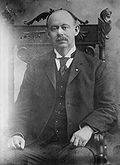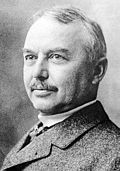| ||||||||||||||||||||
| ||||||||||||||||||||
 County results Proctor: 40–50% 50–60% 60–70% 70–80% Clement: 40–50% | ||||||||||||||||||||
| ||||||||||||||||||||
| Elections in Vermont |
|---|
 |
The 1906 Vermont gubernatorial election took place on September 4, 1906. In keeping with the Republican Party's "Mountain Rule", [1] incumbent Republican Charles J. Bell did not run for a second term as Governor of Vermont. At the start of the year, Percival W. Clement and Fletcher D. Proctor were the leading candidates for the Republican nomination. [2] [3] When it became clear that Proctor had the support of state Republican convention delegates, Clement ended his campaign for the nomination. [4] He filed as an Independent candidate for the general election and was subsequently endorsed by the Democratic Party. [4] [5] In the general election, Proctor easily defeated Clement. [6]

